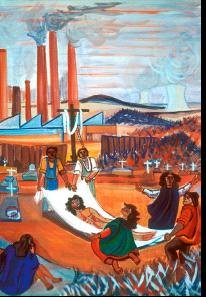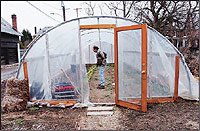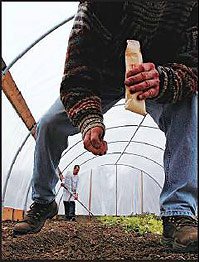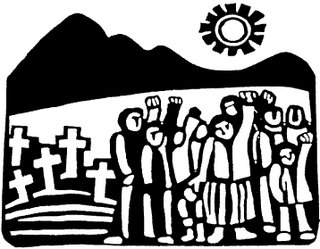touching on the fears
Over the past few weeks, I have had some of the most intense dreams I have ever had. It almost seems as though my deepest, deepest fears are being played out in my mind, one at a time, in what seems to be a three-part series. In one sense, I am profoundly fascinated by how the human mind/sub-conscious works. In another sense, I am profoundly shaken and scared about who I really am, in light of my fears.
Dream One: This dream theme has recurred several times over the past few weeks (months?). The plot has been different, but the idea remains the same: I am in a position where I am about to be violently attacked, sometimes with a knife, sometimes with a gun, sometimes with a bat/rod. Sometimes the attacker is just one person, sometimes it is a group of people. In my dreams -- and it is difficult for me to be honest about this -- I always fight back, trying to outsmart the attacker(s) and trying to get away alive.
The scary thing, for me, is that this dream feels too real -- but it's not so much the attackers who cause me to wake up in a cold sweat, but the fact that, at my core, I am violent and am interested purely in my own survival. When I wake up from these dreams, I can feel that realness, and I can't escape the fact that, if I were faced with a situation where I was about to be attacked, I would react in the exact same way that I do in my dreams.
You, the reader, may be thinking: That's natural; there is nothing wrong with a survival instinct and, in fact, it is oftentimes foolish for one to put one's self in harm's way. To which I would reply: No doubt. Yet, that is not who I want to be. I do not want my most basic reactions to come from a concern for self-preservation. Instead, I want to dig my heart-roots into the fertile soil of Truth, into a deeper humanity, so that, when the time comes for me to face the bullet or the knife or the bar, transformation might occur, even if not in the immediate moment. I want to be able to stare the attacker back into God's mothering arms -- back into that powerful, yet safe, grasp.
That is what I want.
But right now, I am scared (and aware) that that is not who I am.
Dream Two: This dream came right after the series of dreams mentioned above. In Dream Two, I see myself in relationship with others -- particularly those closest to me, those whom I care a lot about and love beyond words. In this dream (which occured two nights ago), I am with one of those people, and, as we communicate back and forth, I quickly get frustrated -- even angry -- because I allow myself to be defined by my past instincts, thoughts, feelings, and reactions. In other words, who I was in the past was setting up, in my mind, expectations of who I will be in the future, and I was trapping myself in my own expectations, unable to break free and be the person who I really wanted to be.
This, too, I have realized, is one of my deepest fears: That my ego and my pride will overpower me from breaking into a better me -- that I will not have the courage to acknowledge my faults and my vulnerabilities so that I might take one more step closer to becoming more whole and more human. At my most basic level, I am terrified of exploring the unknown and putting faith in the mystery, even when I can feel that the known and the un-mysterious are no longer serving their purpose and are, in fact, crushing my potential as a child of God.
Dream Three: I had this dream last night and, like the other two, it shook me into a cold sweat and trembled me in ways I did not want to be trembled. The dream was this: I went walking by the garden at Mound and Carpenter -- the garden where I spend most of my time when I'm working with City Farm... the garden that continually occupies my thoughts and my visions. As I walked by the garden, I looked and saw that everything -- every aspect of the plot -- had been erased. All the plants that the kids and I had spent so much time nurturing into the ground, all the seeds that we had planted, all the string and the rocks and the artsy/creative stuff that we did with the lot -- everything had been erased. And all that was left was a level field of dirt.
All I could do was yell once I saw what had happened. I yelled and yelled and yelled. I was so angry, and, thinking I knew who did it, I went to their house and cursed them out. My anger bubbled inside, and my words came out red hot. "How dare they! How dare they erase all that hard work and all that effort!"
As I was yelling in my dream, my cell phone started ringing (in reality). Confused, I woke up, went to the phone, and saw my friend Christopher calling... at 4:59AM! As By the time I was cognizant enough to realize what was happening, my phone stopped ringing, and I went back to bed. And when I got back to bed, all I remember thinking was, "It was only a dream... the garden is fine... it was only a dream," as if I needed to convince myself that I could stop yelling and could let go of my anger -- that none of it really happened.
This third dream represented my third deepest fear: That, without my work, I am nothing.
Who was I once the garden work was erased? I was someone who could do nothing but yell and scream and get angry, because the garden represented (represents?) everything I ever cared about and loved and fought for and sacrificed for. Without that garden, without that proof that I am doing something, my fear was/is that I am nothing.
Three fears, in three dreams, three nights in a row. Only God knows what tonight will bring.
Thank you for seeing me into my next stage of growth.







